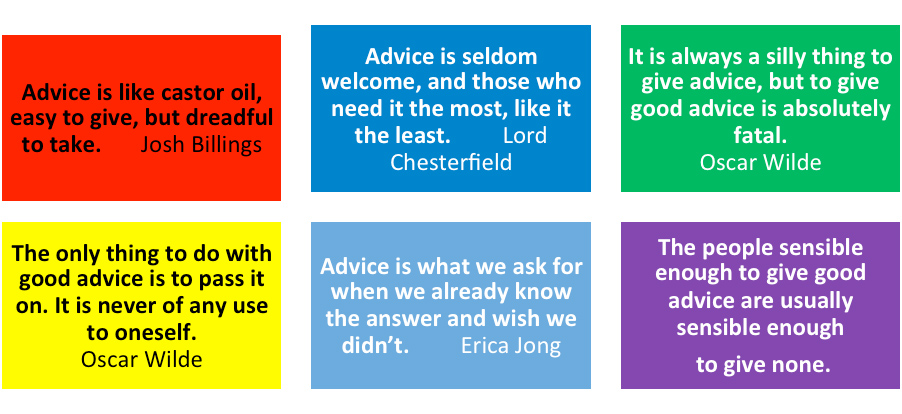Reasons Why I Don’t Give Advice
 ADVICE: It’s a topic that never ceases to emerge when people are learning to coach more effectively. Recently after coaching a participant during one of our seminars, the question was asked, “How do you keep from giving advice?” I answered the question then and with your permission I’d like to explore the topic with you as a reader.
ADVICE: It’s a topic that never ceases to emerge when people are learning to coach more effectively. Recently after coaching a participant during one of our seminars, the question was asked, “How do you keep from giving advice?” I answered the question then and with your permission I’d like to explore the topic with you as a reader.
I have begun to be a collector of quotes and here are just a few to start your thinking.

As professional positions go, fewer and fewer really do offer advice because, quite simply, through the years we have both personally and intellectually learned how futile it is, and more importantly, how damaging it holds the potential to be.
Let’s review a couple of writings and research.
What if we begin with finance – the place where it would seem to be the most useful thing to give. A 2009 research study between financial advice and decision-making by Engelmann, Capra, Noussair and Berns illustrated that the brain “offloads” while it is taking in advice. The brain goes into neutral and the actual advice does not embed in the neocortex while the advice is being given. As a consequence, ownership might happen later or not happen at all. In my own experience a few years ago, I sought advice about placement of monies from the sale of my parents’ home. It was very interesting to me how the financial advisor would never offer his advice even with me asking, “What would you do?” His answer was always the same, “It depends; every person and situation is different.” Then he proceeded to lay out some pros and cons to various options that would best be determined by me alone. Wow! I was impressed and truly challenged to think deeply about my situation and what was best for me, my children and my family. I believe the process taught me so much and I felt very proud with deep ownership of my decision.
As we conclude this segment, let’s consider our field of education – that place we know best. For some reason advice giving is still very much alive and well. There are numerous writings and research that offer information to support the opportunity to pause and to reflect on what we all might do more skillfully. Education is for the purpose of learning, and to learn our brains have to do its work by considering fact and opinion, truth and non-truth, pro and con, impact and outcomes, etc. David Rock in his writings and books continues to remind us that we are in the Information Age and the most important thing we teach others is how to think deeply about how they do their work and make decisions. In Part II we will consider current leadership research and some language and strategies we might put in place to grow educators as well as students – our priority. So until then, what if we reflect on two types of situations – 1) situations where advice never enters your mind, and 2) situations when your mind is screaming to offer advice. Sounds like fun action research!